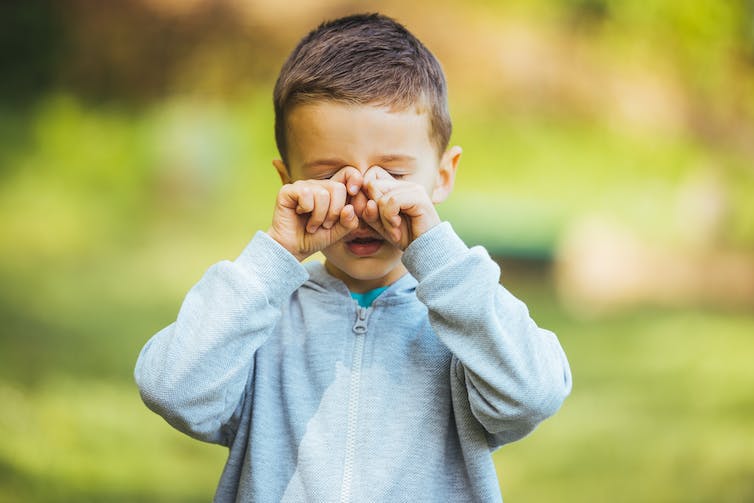
Octa corp/Shutterstock
While the arrival of spring brings blooming flowers and trees, it also marks the beginning of allergy season for many people. Those who suffer from hay fever may start to notice familiar symptoms such as sneezing, itchy eyes and a runny nose.
Hay fever, also known as allergic rhinitis, affects up to 42% of people and can significantly impact their quality of life during the spring and summer months.
When a person with hay fever comes into contact with an allergen (pollen), their immune system mistakenly identifies it as a threat and produces an antibody called immunoglobulin E, or IgE, to neutralise it. The IgE antibodies then attach themselves to a type of immune cells called mast cells, which are found in the nose, eyes and lungs.
When the allergen comes into contact with the IgE antibodies on the mast cells, it triggers the release of histamine and other proteins, causing inflammation and the symptoms of hay fever.
But why do so many people get hay fever, while others don’t? There are a range of factors at play.
Table of Contents
Genetics, immunity and the environment
Genetic factors play a significant role in determining a person’s susceptibility to hay fever. Several genes, including those involved in immune system regulation and response, have been linked to an increased risk of developing hay fever.
Research has shown that the heritability – that is, the degree to which differences in people’s genes account for variations in their traits – ranges from 33% to 91% for hay fever. So, if people in your family have hay fever, you’re more likely to have it too.
Read more:
Do I have COVID or hay fever? Here’s how to tell
Some people’s immune systems may overreact to allergens, leading to an allergic response and the development of hay fever. In fact, having other allergies, asthma, allergic dermatitis or eczema can increase your risk of developing hay fever.
Environmental factors such as exposure to air pollution, tobacco smoke and other irritants may also make a person more susceptible to hay fever. This can be due to damage to the nasal passages and respiratory system, making it easier for allergens to enter the body and trigger an allergic response. Similarly, exposure to second-hand smoke in early life is a risk factor for later development of hay fever.
Some people may be exposed to allergens more frequently or in larger amounts than others, making them more susceptible to developing hay fever. This can be due to living in an area with high levels of pollen or being exposed to certain allergens at work, for example.
Why can symptoms be worse in some seasons more than others?
The amount of pollen or other allergens in the air can vary from year to year and season to season. In some years, the pollen count may be higher, leading to more severe hay fever symptoms.
Weather conditions, such as temperature, humidity and wind, can affect the amount and distribution of pollen in the air. A rainy spring may wash away some of the pollen, while a warm, dry summer may lead to more pollen production.
The body’s immune system can also change over time, which can affect how it responds to allergens. This means someone who had severe hay fever symptoms in the past may experience milder symptoms as they get older.
Indeed, hay fever can develop at any age, but it’s more common in children and young adults. As a person ages, their immune system may become less reactive to allergens, leading to a reduction in hay fever symptoms.

Dragana Gordic/Shutterstock
People may be exposed to different allergens in different years or seasons, which can affect the severity of their symptoms. For example, someone who is allergic to grass pollen will be triggered at different times to those triggered by certain tree pollen.
Lifestyle factors such as stress, diet and exercise can affect the immune system and may contribute to the severity of hay fever symptoms. For example, stress can weaken the immune system, making it more susceptible to allergens.
Climate change is also altering the quantity and composition of pollen that plants release, as well as the timing. Increasing temperatures and atmospheric carbon dioxide levels are causing some plants to produce more pollen, while other species are shifting their flowering periods to earlier in the year. This means pollen seasons are starting earlier, lasting longer, and becoming more intense.
Tips for managing hay fever
Avoid allergens: Try to avoid exposure to allergens that trigger your hay fever symptoms. This may mean staying indoors during high pollen counts or wearing a mask if you’re working outdoors.
Use air filters: Consider using Hepa (high-efficiency particulate air) air filters in your home or workplace to help remove allergens from the air.
Keep windows closed: Closing windows during high pollen counts will prevent allergens from entering your home.
Take antihistamines: These are medications that help reduce hay fever symptoms by blocking the effects of histamine, which is released during an allergic reaction.
Consider immunotherapy: Immunotherapy, also known as allergy shots, can help reduce hay fever symptoms by desensitising your immune system to specific allergens over time.
Manage stress: Stress can make hay fever symptoms worse, so try to manage it through techniques such as meditation, yoga or deep-breathing exercises.
It’s important to talk to your doctor before starting any new medications or treatments for hay fever.
![]()
The authors do not work for, consult, own shares in or receive funding from any company or organisation that would benefit from this article, and have disclosed no relevant affiliations beyond their academic appointment.























